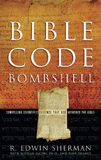| |
 Answers to Frequently Asked Questions
Answers to Frequently Asked Questions
About Bible Codes
Where can I get a quick introduction
to the basics of Bible codes?
Click Here for answers to such essential questions as, �What are Bible codes?�, �What is an example of such a code in an English text?�, �Why have Bible codes been controversial?� and �For what people or events have proponents claimed there were clusters of Bible codes?�
Who Publishes Bible Code Digest?
The Isaac Newton Bible Research Society was formed to conduct research of the Hebrew Bible for a variety of statistically-relevant anomalies, including encoded phrases and letter frequency variances. The Society publishes Bible Code Digest, an on-line newsletter, and a web site with news of the findings of its researchers and others in the field, and conducts seminars on the subject.
Who Heads Up Bible Code Digest?
Click here for details about the people and behind the web site and newsletter.
Is Bible Code Digest a Profit-Making Institution?
Click here for details about BCD's financial situation.
If You Have a Basic Understanding of Bible Codes, and Want Bottom-Line Answers to the Key Questions, Read On . . .
|
What has been the main response of skeptics to the claims of code proponents?
Similar kinds of codes can be found in any book.
Are the skeptics right?
Definitely not. All the skeptics showed was that very simple clusters of short codes can be found in any book. The examples they provided from Moby Dick and War and Peace were fairly comparable to many of the simpler published examples, but they are seriously out of date. Some proponents� recently discovered clusters of Bible codes are so complex and extensive that they really couldn�t be a coincidence. The most extensive cluster of Bible codes found to date (the Isaiah 53 cluster) is vastly more complex and improbable than the most extensive cluster found in any book other than the Bible. There really is no comparison. Click here for details.
Isn�t it true that there is no limit to the number of ELSs that can be found in the Bible?
Though very large, the total number of ELSs in the Hebrew Bible is actually quite limited. In fact, it is a bit less than 20.2 trillion. That�s in the same ballpark with the Gross National Product of the United States.
Couldn�t you find relevant ELSs about any topic if you looked long enough in any text?
It heavily depends on how long the ELSs are. If the ELS is eight or less letters long, it is almost certain we will find it somewhere within the Hebrew Bible at some skip. If it is 10 or more letters long, it is unlikely we will find it anywhere. And the longer it is, the more unlikely it is that we will find it anywhere. For example, if it is 15 letters long, the odds are 1 in 1.3 billion against finding it anywhere in the Hebrew Bible. If it is 20 letters long, the odds are 1 in 9,621 trillion against finding it anywhere. This is why the longest codes discovered are so exceedingly significant.
So what makes the difference between a coincidental and a highly improbable cluster?
The coincidental one will only have ELSs that are eight or fewer letters long. The highly improbable cluster will have a number of ELSs that are 10 or more letters long. The longer the ELSs the better, and the more long ELSs in the cluster the better. How close together or spread out the ELSs are is also a factor.
Is this distinction illustrated by comparing the Isaiah 53 and the Hanukah clusters?
Yes. Dramatically so, as detailed in our report, the Hanukah cluster only consists of seven ELSs and the longest one is seven letters long. The Isaiah 53 cluster includes over 1,200 ELSs and 19 of them are 10 or more letters long. The ten longest ELSs are 22, 21, 19, 19, 18, 17, 16, 16, 15, and 14 letters long, respectively. There is no comparison.
Couldn�t codes about Jesus have been embedded in the text after he lived?
No. The Hebrew Bible was completed between 100 and 400 years before Christ lived. The Dead Sea Scrolls provide copies of nearly all of the Hebrew Bible that date back to many decades before Jesus was born.
What clusters other than Isaiah 53 are significant?
Extensive clusters of ELSs about Christ have also been discovered in Psalms 21-23 and Proverbs 14-18 as well as sections of Genesis and Exodus. Highly improbable, though not as extensive, clusters have been discovered about the Holocaust in Genesis 8 and in three sections of Deuteronomy.
Are all codes real?
Certainly not. Many codes are just coincidental. A real code must be intentional. Some Bible code examples and phenomena are so improbable that chance should be ruled out as a reasonable explanation, and we should conclude that they were intentional.
How can you know for certain whether or not a particular code is intentional?
You can�t. There�s always some chance, however small, that the code could be coincidental. Like other codebreakers, Bible code analysts use statistics to help them evaluate codes. We can know �beyond a shadow of a doubt� that a given code was intentional if statistical analysis shows that the odds of its chance occurrence are extremely small (e.g., less than 1 in a trillion).
Can you know for certain that a code cluster is predominantly real?
Yes. If the odds of the combined cluster appearing by chance are extremely small (say, less than 1 in a trillion times a trillion), then chance should be ruled out.
Why would God give us codes we can�t understand?
That is an excellent question. Some of the codes we turn up are easily understood, but some of them -- especially the longer ones -- are difficult to interpret. In fact, we believe that some of them are imparting several unconnected thoughts.
After giving this a great deal of consideration, we have decided that since we are on the cutting edge of this research, we will simply not be able to comprehend a lot of what we find. Eventually, we (or other researchers) will be able to put it all together. The longer codes may be combined with numerics, three-dimensional ELSs, parallel codes, or other disciplines that have not yet been applied to them. In truth, the sky is the limit.
A fair comparison is the surface text of the Bible itself. To someone unfamiliar with it, the text is strange and incomprehensible. Parts of the book of Revelation, for instance, are difficult to understand even for those who read the Bible daily. And yet down through the centuries, researchers have unlocked the great truths of the Bible and how they all fit together.
And if the message of a code is mysterious, perhaps God wants us to focus on the existence of messages as opposed to their specific content.
Our philosophy is based on the Old Testament verse that reads, �It is the glory of God to conceal a matter . . .� (Proverbs 25:2)
What major contribution have skeptics made to code research?
They have helped people to understand that if someone presents only a few short codes, all they have done is come up with something you could pull out of almost any book. That�s clearly worth knowing, for otherwise people might to jump from some simple code example to highly unwarranted conclusions. Such abuses should be avoided if at all possible.
What is your view of the statement by 55 mathematicians that there is no substance to the codes?
The petition signed by 55 professors was a statement of opinion based on their review of the state of Bible code research as of about 1997. Many findings have been made since then that are far more improbable than anything published at that time. Consequently, the petition is seriously out of date. Click here for more on this topic.
Do the codes have anything to do with Biblical numerology or kabbalah?
No. One kabbalistic device, the �cipher disk,� was adopted by cryptologists looking for a way to break codes in the middle ages of Europe. This forerunner to the German Enigma machine of World War II is the only connection between codes and the mystical offshoot of Judaism known as kabbalah. There is no direct connection between kabbalah and Bible codes.
Are abuses of the codes a good reason to dismiss the whole thing?
The Bible has often been misused. Is that a reason to reject it? Of course not. Various dubious code practices are analogous to the bad practice of quoting Bible verses out of context. The cure isn�t to throw the whole thing out, but to approach it correctly. Much education is needed. Over time, the difference between proper, in-depth research and na�ve or self-serving misuse will become evident.
Can Bible codes be used to predict the future or to discover new truths?
No. Here are six reasons: 1) Codes are typically open to multiple interpretations since the text used has no vowels or syntax markings and Hebrew is a very terse language. 2) We often can�t be sure where spaces between words should be. 3) There is no assurance that the code(s) comprise the whole message. 4) It might just be a coincidence. 5) Clusters about different events could simply overlap, so how could we be certain that just because two codes were close to one another, they must be related. 6) Finally, copying errors by ancient scribes, or changes in spelling conventions, may have changed the spacing a bit, creating some unintended ELSs. If codes provided a message that contradicted the literal text, it would be foolish to accept its content as preferable�given all of the uncertainties just cited.
What valid purpose(s) could Bible codes serve?
They could possibly serve as a source of authentication of the Bible�that it was written by an intelligence far greater than that of any human being�who knew the future when it was written. Codes could also serve as evidence in clarifying the meaning of various literal passages. For example, if something had been prophesied in a given passage, and there is uncertainty as to whether or not some subsequent event was a fulfillment of that prophecy, the existence of an extremely improbable cluster of codes about that event (or person) might serve as supporting evidence.
How can modern words like airplane, missile, and John F. Kennedy possibly be found in Bible codes?
We believe that God is not bound by time, and as the author of the Bible, He would know modern Hebrew words. We are chronological beings, and we have a hard time thinking in any other terms. But God is present in the past, present, and future simultaneously, and is therefore not bound by what we consider as ancient and modern.
What is the difference between "good" and "acceptable" Hebrew?
Just as in any language, there is a good way to express a thought and an acceptable way. One way to think about it is the way we greet one another. You could say, "Good morning" or you could say "mornin." The first would be "good" and the second "acceptable." Generally, acceptable codes are less transparent and use rare and/or sometimes convoluted ways of expressing ideas.
|
Enjoy finding your own Bible codes.
Bible code search software is available in our online store.
Subscribe Free!
By signing up to be a member of The Isaac Newton Bible Research Society, you will have access to more than fifteen years of research by our team of Bible code researchers.
Sign up to be a member today.
|
|
Now available, donate using PayPal ↓
 
Bombshell examines two massive, recently discovered clusters of codes in the Hebrew Old Testament. To read more about Bombshell, click here, or click below to order from Amazon today!
 
|





